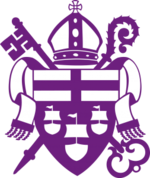Diocese of Virginia
| Diocese of Virginia | |
|---|---|
 |
|
| Location | |
| Ecclesiastical province | III |
| Subdivisions | 15 Regions |
| Statistics | |
| Parishes | 182 (2014) |
| Members | 77,377 (2014) |
| Information | |
| Rite | Episcopal |
| Cathedral | Cathedral Shrine of the Transfiguration |
| Current leadership | |
| Bishop | The Rt Revd Shannon Johnston Ted Gulick (Assistant Bishop) |
| Suffragan | The Rt Revd Susan E. Goff |
| Map | |
 Location of the Diocese of Virginia |
|
| Website | |
| thediocese.net | |
The Diocese of Virginia is a diocese of the Episcopal Church in the United States of America encompassing 38 counties in the northern and central parts of the state of Virginia. The diocese was organized in 1785 and is one of the Episcopal Church's nine original dioceses. However, the diocese has origins in colonial Virginia. In 2009, the diocese had 79,688 members in 182 congregations and is thus the Episcopal Church's largest domestic diocese (the Episcopal Diocese of Haiti is larger).
The see city is Richmond where Mayo Memorial Church House, the diocesan offices, is located. The diocese does not have a conventional cathedral church but rather an open-air cathedral, the Cathedral Shrine of the Transfiguration (Shrine Mont), which was consecrated in 1925. Shrine Mont in Orkney Springs, Virginia is also the site of a diocesan retreat and camp center. The diocese also operates the Virginia Diocesan Center at Roslyn in western Richmond, a conference center overlooking the James River. Virginia Theological Seminary, the largest accredited Episcopal seminary in the United States, is located within the diocese in Alexandria, Virginia.
Anglicanism came to Virginia in 1607 with the settlers who founded Jamestown. The charter of the London Company instructed them to adhere to the practices of the Church of England, and between 1607 and its dissolution in 1624, the company sent 22 ministers to the colony. These ministers were not only concerned for the spiritual lives of the colonists but also attempted (largely unsuccessfully) to convert the Native Americans. When Virginia's General Assembly first met in 1619, it passed a series of laws concerning the church, including formally designating the Church of England as the established church of the colony. To keep pace with the colony's growth, the Burgesses ordered each settlement to set aside a house or room as a place to hold regular worship services.
...
Wikipedia
